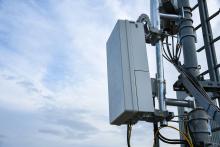So which way will it go? We're bullish and believe the market will succeed. For cautious enterprise IT professionals, even a safe "somewhere in the middle" projection means that Wi-Fi hotspots will play a role in business-technology plans, in two ways: First, if your organization has a significant number of mobile workers, particularly those who make intensive use of notebook PCs to do their jobs on the road, Wi-Fi hotspots can yield major productivity benefits. Second, and perhaps more interesting, your organization could end up becoming a hotspot venue, and not just if you work in IT for Starbucks Corp. Think about how pay phones used to be deployed in your organization's facilities, mainly as a courtesy service for visitors. It's not much of a stretch to imagine Wi-Fi hotspots moving in the same direction. In fact, Bell Canada is converting pay phones into Wi-Fi hotspots as we speak.
The Basic Technology
About 20,000 hotspots are online today, and Gartner estimates that the market will grow sixfold to about 120,000 worldwide by 2007. Cometa Networks, a start-up hotspot wholesaler with heavy support from AT&T, IBM and Intel, plans to build 20,000 hotspots by the end of 2004. Toshiba, known to most as a provider of mobile devices, pledges 10,000 hotspots by the end of this year using its inexpensive and easy-to-deploy systems. Although these numbers may sound big--and they are--remember that with today's technology, a single hotspot's coverage area is not much bigger than the inside of your house.
Unlike traditional GSM and GPRS or CDMA voice/data infrastructures used by cellular carriers, where coverage is measured in blocks and miles, hotspot coverage is best measured in rooms and feet. But look at the economics of buildout and you'll see that smaller range also carries a smaller price tag: Deploying a CDMA cell will set you back about a million dollars, while a Wi-Fi hotspot might cost only a few hundred dollars. Of course, deployment better be cheap, because before service achieves anywhere near ubiquitous status, we'll need far more than the 120,000 locations Gartner projects--we're talking millions of hotspots. Is there a business model to support that kind of buildout?
|
FYI
By 2007, about 25,000 hotels worldwide will offer some degree of Wi-Fi connectivity, up from just 1,000 last year, according to a Pyramid Research report that covered 40 hotels, including Marriott Hotels and Swissotel, as well as service providers, operators and hardware providers.
|
Some experts are doubtful. Andrew Seybold, a respected wireless industry analyst and founder of the Outlook 4Mobility group, says he is surprised that so many otherwise sane people have jumped on the Wi-Fi hotspot bandwagon. Seybold acknowledges that there are valid cases where hotspot deployments make sense--a prime example: if it helps you sell more coffee--but says he sees no economic model for an independent hotspot business, including those being promoted by wireless service providers and wholesale hotspot companies.








